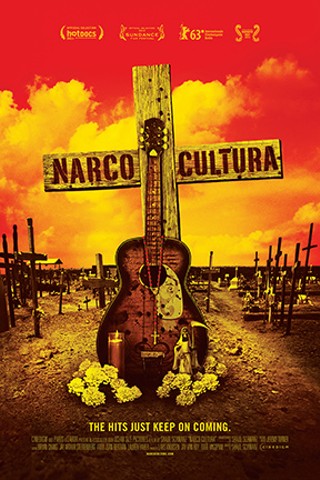If you don't know how to speak Spanish, a listen to a narcocorrido song might have you thinking it was harmless enough. It would feature a relatively jovial singer over some tuba and accordion background, which hardly equates to anything threatening to unknowing ears.
As it turns out, narcocorrido is a superviolent form of music that glorifies the lives of Mexican drug cartel criminals. Perhaps taking their cue from American gangsta rap, Buknas de Culiacan, a Los Angeles-based narcocorrido band, tours America equipped with tubas, Mexican guitars, AK-47s and bazookas strapped to their backs.
Edgar Quintero is one of the people focused upon in director Shaul Schwarz's revealing and brutal documentary, Narco Cultura. Quintero is the lead singer of Buknas de Culiacan, a band of increasing popularity that boasts lyrics such as "Cross my path and I'll chop your head off." Their concerts often inspire happy dancing and singalongs.
The real, horrifying life they are glorifying is also examined in the film, as Schwarz does ride-alongs with Riccardo Soto, a forensics agent tasked with examining cartel murder scenes riddled with bullets and body parts. Soto resides in Juarez, Mexico, just south of El Paso Texas. El Paso is annually ranked as one of the safest cities in America. Juarez is one of the murder capitals of the world.
Schwarz juxtaposes the two lifestyles, that of a band playing the Staples Center to sold-out crowds singing tunes about death and dismemberment, and that of the guy putting severed heads and arms in body bags. One group is definitely having more fun than the other.
Even though Soto puts his life at risk everyday and is served a daily dose of death at his job, he's oddly at home and comfortable with his profession.
Schwarz films the quiet, reserved Soto, who has a girlfriend in El Paso, visiting the city. He shops at J.C. Penney, and eats in the food courts. He's bored out of his mind and breathes a sigh of relief when he returns to Juarez. He comments on how El Paso has too many rules, and how he can at least feel free in Juarez, even when the streets are soaked with blood. How very strange.
In contrast, we see Quintero doing a back-seat deal for a song he's written on special order for a criminal. He doles out some lyrics and accepts a roll of bills as if doing a drug deal. Quintero, who is raising kids and living a relatively meager life in L.A., looks for his band to grow bigger and life to get better. He also, to the chagrin of his bemused wife, fantasizes about living the real cartel life in Juarez because it would be good fuel for his music.
The movie has some jarring imagery, including quick cuts of real Mexican cartel snuff films, piles of body parts next to police cars and charred people being removed from fire-blasted cars.
While folks like Soto deal with the mess, Schwarz goes into how narcocorrido music is selling like crazy at American Walmarts, and concerts are selling out as far north as New York.
Before seeing Narco Cultura, I wasn't fully aware of the growing narcocorrido movement. Heck, the closest I came to seeing or hearing narcocorrido music was when that trio sang about bad things for Walter White/Heisenberg on Breaking Bad. (After writing that statement, I looked up a behind-the-scenes thing on Breaking Bad, and it turns out that was an authentic narcocorrido band hired to sing about the death of Heisenberg.)
Narco Cultura might not be the year's best documentary (that's a contest between The Stories We Tell, The Armstrong Lie and Blackfish), but it's a good one. By going into the belly of the beast, Schwarz has put together one of the better looks at Juarez you are likely to see. As for narcocorrido, I won't be buying any Buknas de Culiacan CDs anytime soon.











